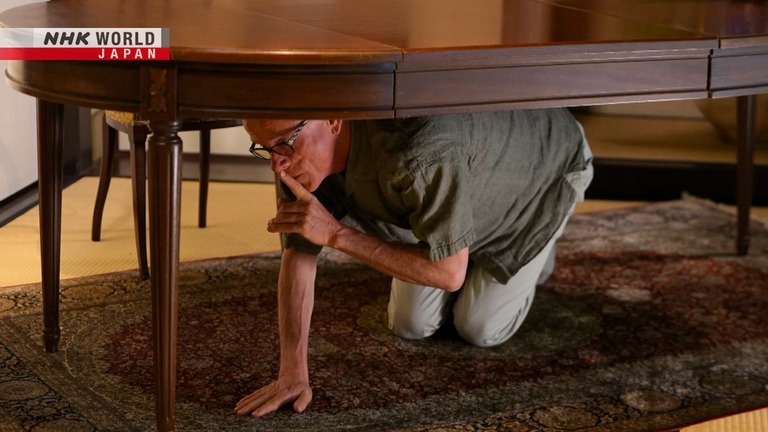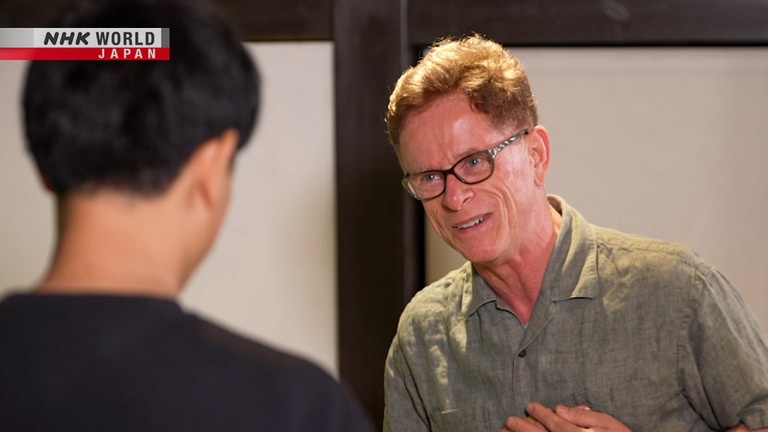Shadow / Shade
The Japanese language is rich in words and expressions influenced by nature, history and culture. This episode focuses on words related to kage, meaning both shadow and shade. From rooting for someone working toward their dreams, to expressing appreciation for those around you, words involving kage are surprisingly common in daily conversation. From his home in Kyoto Prefecture, poet and literary translator Peter MacMillan guides us through such unique words and the culture behind them.




Transcript
"Yukigesho."
"Karakurenai."
The Japanese language is rich in unique expressions, that reflect nature and culture.
Magical Japanese.
Today's theme is "kage," or shadow.
Hello, I'm Peter MacMillan.
Can you tell what this is?
It's a dog!
This is "kage-e," meaning "shadow pictures," and it was all the rage among commoners in the Edo Period.
You create shadows with your hands to make different animals.
There's more!
Look: a bird...
and a fox!
Aren't they brilliant!
The word "kage" usually means the shadow formed by blocking light.
But long ago there were other meanings, too.
There's the "kage" to describe form or appearance.
That meaning can be found in this expression:
"omokage."
"Omo" means "face."
"Omokage" refers to someone's facial appearance.
You have the "omokage," looks, of your father
when he was young.
"omokage."
"kage o hisomeru."
"Hisomeru" means "to hide oneself."
The phrase is used when a prominent person or a phenomenon disappears, often temporarily.
Thanks to the persistence of the police,
illegal parking has "kage o hisomeru," disappeared for the time being.
"kage o hisomeru."
The next phrase doesn't suit Peter at all!
"kage ga usui."
"Usui" means thin or sheer.
The phrase refers to someone who leaves a weak impression or tends to be in the background.
A: Did you invite him to the party?
B: Oh no, I forgot!
He's a bit "kage ga usui," inconspicuous, you know...
"kage ga usui."
Here's another unique phrase using "kage:"
"kagemusha."
"Musha" is a warrior.
When Japan was engulfed in civil war, warlords and others in power would protect themselves
by having their look-alikes act as stand-ins, or "kagemusha."
The word is used today, like this:
A: We've finally caught the criminal!
B: Wait, he's a "kagemusha," stand-in!
"kagemusha."
And this is what Peter and the crew are up to now:
"satsuei."
"Ei" is another reading for "kage."
"Satsuei" means to shoot a photograph or moving image.
Peter is fully prepared for the "satsuei," shooting, today.
"satsuei."
"iei."
"I" means to remain or to be left behind.
An "iei" is a portrait of a deceased person.
People often keep these portraits in frames, or carry them as a reminder of their loved ones.
"iei."
Take a look at this ball.
In English, what we call a shadow occurs when light is blocked by an object.
Shade refers to an area of the object where light doesn't reach.
In Japanese, "kage" means both shadow and shade.
The next phrase uses "kage" in the meaning of "shade."
"kage no tateyakusha."
"Tateyakusha" is someone who plays a central role in a project or endeavor.
Used with "kage," as in this phrase, it refers to a person who has made a less visible, but nevertheless important contribution.
This project couldn't have succeeded without her assistance.
She is the "kage no tateyakusha," unsung hero.
"kage no tateyakusha."
"kagenagara."
"Nagara" here means "although."
"Kagenagara" literally means "albeit from the shade," and it's used to express humility and affection.
The phrase reflects the Japanese appreciation of modesty and humility.
No matter how far away you go to follow your dreams, I'll be rooting for you "kagenagara," in my heart.
"kagenagara."
"Kage" has another surprising hidden meaning.
Here's the phrase I wanted to share with you most today.
"okagesama de."
"Okage" combines "kage" with "o," an honorific, and refers to help received from divine forces or from other people.
This is followed by "sama," an honorific form of address, and "de," meaning "with."
"Okagesama de" is used widely in daily conversation, when you receive special support from someone, or simply when things go well for you.
A: I remember playing with your son when he was younger. Is he already out of college?
B: Yes, "okagesama de," thankfully, he graduated this year.
I think the phrase "okagesama de" expresses Japanese spirituality.
In life, invisible divine protection supports you.
We live thanks to all the help around us.
Buddhist teachings like these seem to be deeply entrenched in Japanese life.
When we achieve things, we are not the sole creators of our success.
We succeed because of the support around us.
You can appreciate the Japanese spirit: giving thanks where it is due.
For me, one of the best expressions I learnt when I came to Japan was "okagesama de."
I's a lovely and polite way to express one's feelings of thanks, and people are usually delighted when they hear it being spoken to them.
"okagesama de."
To receive such "okage," people would often pray to the deities.
"okage mairi."
"Mairi" is a visit to a shrine or temple.
"Okage mairi" means a pilgrimage to earn blessings.
This was a popular activity in the Edo period.
People throughout Japan traveled all the way to Ise Shrine in Mie Prefecture, western Japan, which had a special status.
It was believed that once every 60 years, there would be a year of exceptional blessings for worshippers.
Records show that in one such year, around 4.6 million people visited Ise Shrine over a six-month period, with most of them traveling on foot.
What did you think?
"Okagesama de" I've lived in Japan for a long time, thanks to the support of all those around me.
And "kagenagara," I'm rooting for you, as you continue on your journey to learn Japanese.
See you next time.
Bye!